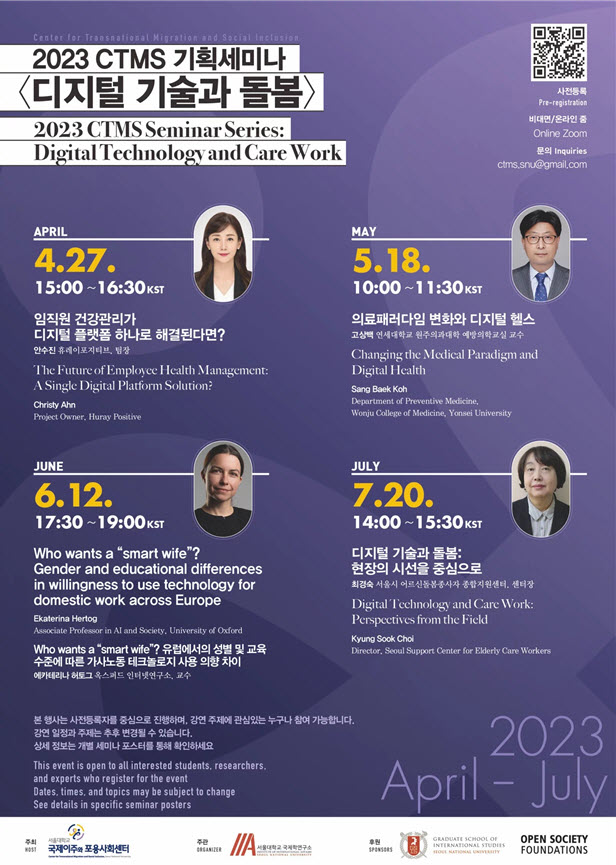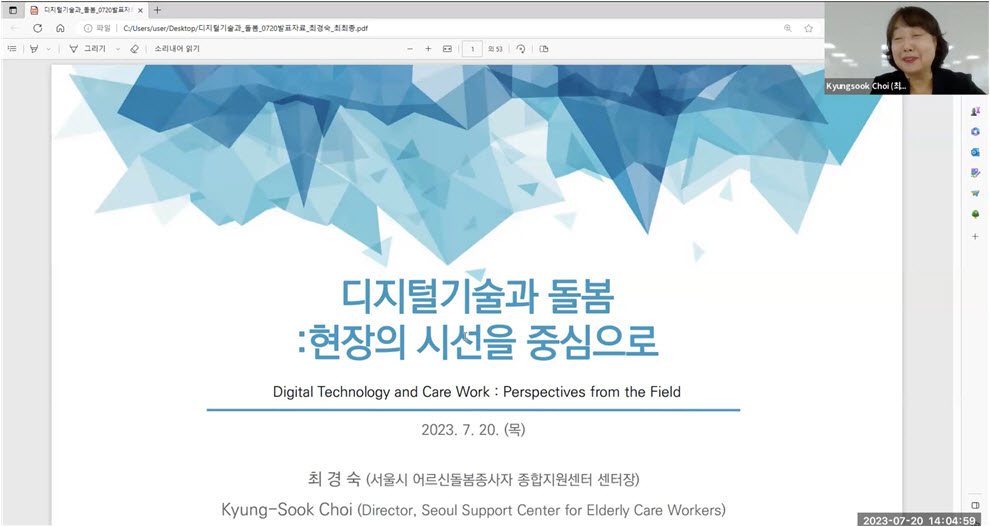A part of the Seoul National University Institute of International Affairs, the Center for Transnational Migration and Social Inclusion (CTMS) conducts research on sustainable social development. CTMS carries out studies on topics such as caregiving, international migration, and gender equality, often in collaboration with civil society and relevant government ministries. CTMS hosts numerous special and guest seminars on topics such as welfare policies, the caregiving economy, and migrant laborers. This year’s seminar series, titled “Digital Technology and Care Work,” brought together academics and field experts to discuss the potential consequences of recent tendencies to merge digital healthcare technology and caregiving services. The purpose of the series, according to CTMS statements, is to explore the possibility of a caregiving system that reflects the realities of Korean society, which has been experiencing a precipitously declining fertility rate as well as rapid aging. The seminars also examined how stakeholders, including both caregivers and beneficiaries, are perceiving and experiencing the introduction of digital technology.

Poster of the Seminar Series, “Digital Technology and Care Work”
The series consisted of four seminars, running monthly from April to July. Specialists from industry, medicine, social sciences, and the caregiving sector participated. Seminar topics included: the role of digital healthcare services in improving the working environment of healthcare laborers, digital healthcare and the customization of medical services, the impact of automation on housekeeping labor, and the effects of new technology on elderly caregiving. The seminars were open to the public. All lectures were broadcast via Zoom.
Strengths and Drawbacks of Digital Technology in Caregiving
The last seminar of the series, “Perspectives from the Field,” held on July 20, focused on caregiving to the elderly. Kyung-Sook Choi, director of the Seoul Support Center for Elderly Care Workers, presented her work.
Choi introduced some cases in which digital technology can be embedded in the caregiving scene. One example is the digital diaper, which detects and displays discharges through colors. This technology helps caregivers better spot those in need of immediate assistance. Another example is the digital emergency safety assurance system, an emergency relief alert system linked in real time to police assistance, which can help prevent blind spots in protection for the elderly. Other digital services Choi discussed include pet robots, artificial intelligence services for elderly self-support, and automated motorized adjustable beds that can alleviate the physical intensity of caregiver work.

Choi Introducing the Topic of the Lecture
Choi went on to caution that, despite the usefulness of such technology for both caregivers and beneficiaries, problems remain. There are issues of cost burdens and insufficient safety verification. Critics have also suggested that smart technology may sometimes actually increase burdens on caregiving workers. This is because workers need time to get accustomed to new technology, and during the process may suffer from mental stress. New technology itself, Choi warned, cannot be the ultimate solution. Adequate technological education and the deployment of additional personnel must also follow. The supply of caregiving personnel was noted as another key issue. Currently, most of the caregivers for the old are elderly women, and only 24% of those who are formally qualified work as caregivers. “In order to solve this problem, the government needs to create a safe caregiving environment and provide adequate rewards for the caregivers,” Choi said. Choi also proposed that digital technology must be introduced gradually to alleviate potential burdens on workers. One way to do so would be to prioritize devices and procedures most in demand in the field.
During the Q&A session, Choi added that digital technology still has a long way to go in terms of customized caregiving, which is a necessary component of caregiving services. She also emphasized that digital technology must not be developed only for corporate profit, and that society must vigilantly monitor whether technological development prioritizes the needs of caregiving beneficiaries. When asked about how to reduce the gap of service quality among caregiving facilities, Choi proposed that essential technologies be provided as a part of universal welfare through government funding.
The “Digital Technology and Care Work” seminar series yielded insights into how new technology is making its way into caregiving services. Speakers commonly emphasized that the deployment of digital technology needs to take into consideration the specific characteristics of care work, caregivers, and beneficiaries.
During the latter half of 2023, CTMS plans to host lectures on international migration, including sessions on the government’s foreign domestic worker plan. CTMS encourages those interested in caregiving and social inclusion to take part in its forthcoming lectures and discussions.
Source: https://www.snu.ac.kr/snunow/snu_story?md=v&bbsidx=143202
Written by Seunghwan Oh, SNU English Editor, ascendhwan@snu.ac.kr
Reviewed by Professor Jiewuh Song, Department of Political Science and International Relations, jiewuh@snu.ac.kr

